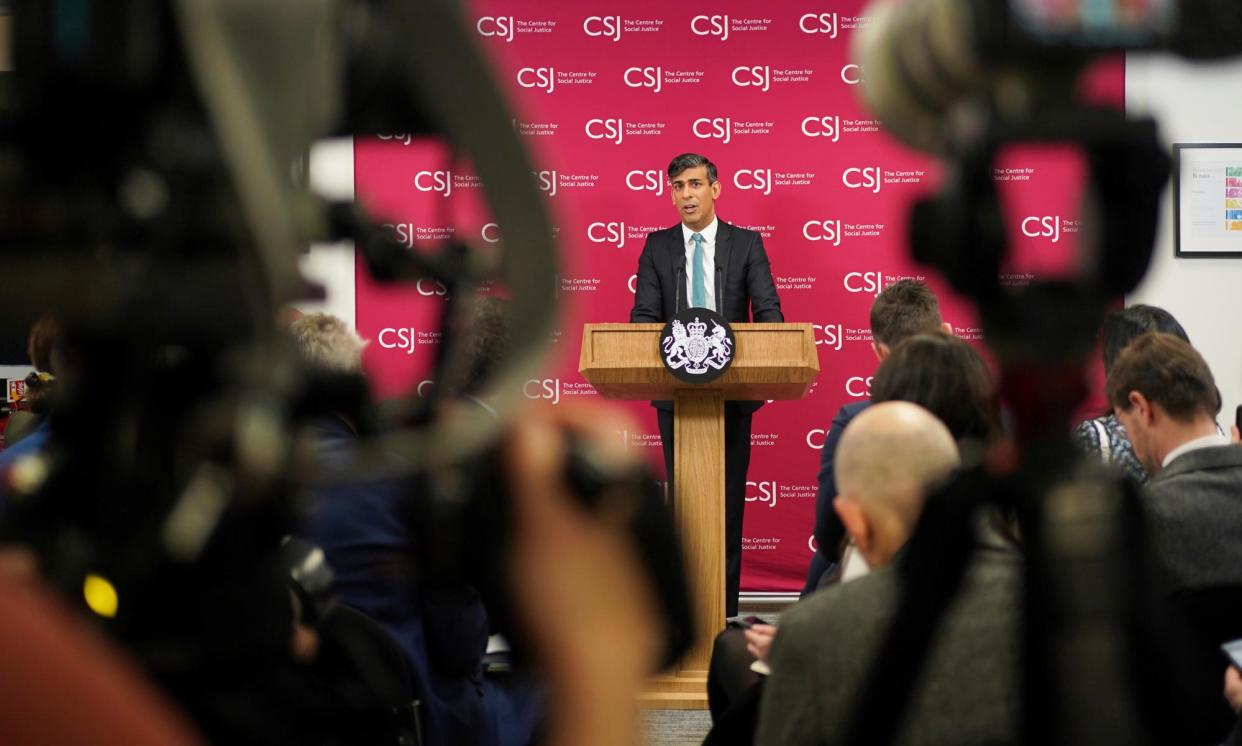Sunak’s disability benefit plans are familiar culture war fodder

Rishi Sunak’s big speech on reforming disability benefits was intended to show that the government had a grip on the economic and health challenges of the UK’s rising levels of long-term sickness. Instead, it came over as an administration running out of ideas, high on strident rhetoric, and desperate to cut welfare bills at all costs.
It was a “moral mission”, Sunak declared, to overhaul the current welfare system, which was “unfit for purpose”. Disability benefits were too easy to cheat, too cushy, too easily claimed. The speech was a clear appeal to the notion, in vogue on the right, that “mental health culture” has “gone too far”.
“Sicknote culture” – the idea that millions of lazy Britons are taking sickies with the connivance of GPs – was also in his sights, although there was little evidence to backup his assertion, or explanation as to how the changes would work. The underlying message was clear: claimants are lazy and the system too generous.
The most significant announcement was the proposed redesign of the main disability benefit personal independence payment (Pip). Ministers are convinced that far too many people – especially those with mental illness – are able to claim Pip, a non-means-tested payment designed to help claimants with the extra costs of daily living.
It is likely to focus on narrowing eligibility to drive down the Pip bill so that fewer awards are made, and at lower rates. Sceptics will point out that his was tried a decade ago, when Pip was introduced in place of disability living allowance. That reform – at the time brutally controversial, and incompetently managed – has clearly failed, even on its own terms.
Sunak sugared the pill of cuts with pious platitudes. He was “giving back hope” to people who had lost all “dignity and meaning” when they became entrapped in the vortex of the welfare state, he said. It was a familiar Tory tune – the idea that millions of people are not so much ill as spiritually lost.
Related: Longest sustained rise in people too sick to work since 1990s, says thinktank
Sunak floated other under-explained ideas: long-term unemployed claimants who refuse to take any job offered to them would have their benefits withdrawn; mentally ill claimants would be offered medical treatment as an alternative to cash benefits. But these felt like fodder for culture warfare rather than serious proposals.
The reaction was fierce. The disability charity Scope called it a “full-on assault on disabled people”. The Joseph Rowntree Foundation described the speech as “an irresponsible war of words on people who already aren’t getting enough support”. The Resolution Foundation said it was “a problem statement, not a plan”.
Labour’s acting shadow welfare minister, Alison McGovern, promised to reduce NHS waiting lists, reform social security and make work pay, but she was not clear precisely how Labour would do this. What is certain is that the challenge of long-term sickness – and the impact on the labour market – will be a priority for the next government.
The Institute for Fiscal Studies (IFS) estimates that one in 10 working-age Britons are receiving health-related benefits, and this is expected to increase. New monthly claims have doubled since the pandemic, especially among young people: a 20-year-old today is about as likely to claim a health-related benefit as a 39-year-old was in 2019.
A Labour government would need to balance restraining the benefits bill while addressing wider reasons behind mental illness such as poverty, insecure work, ineffectual job support and inadequate NHS care. It does not help – as the IFS said – that no one can yet fully explain what is driving the recent explosion in the takeup of health and disability benefits.

 Yahoo News
Yahoo News 
